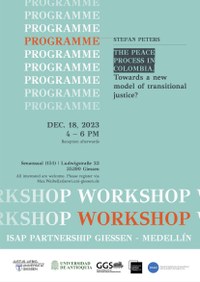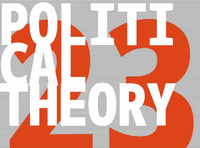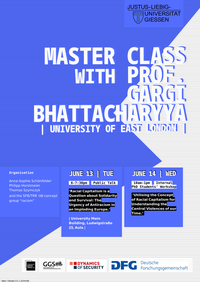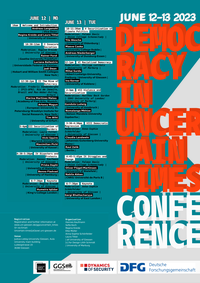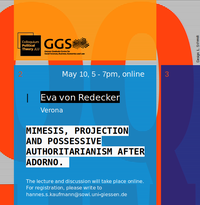Human Rights and Democracy
Mission Statement
|
Human rights are one of the most fundamental elements of modern democratic constitutions. Democracy and human rights are increasingly considered to be cornerstones of valid policies of global governance. Each of these concepts is multifaceted with regard to the content and the form, and the relationship between them is complex. The question arises as to whether (and if so, to what extent) democracy is a prerequisite for the interpretation and forcible implementation of human rights. Do we need the concept of democracy for spelling out the meaning of human rights? Is a democratic process necessary for establishment and legal enforcement of human rights? On the other hand, it does not seem possible for a democracy to exist without human rights – the absence of civil liberties and political rights means that a system of political participation among equals is virtually inconceivable. If this is the case, the question that arises is whether human rights, if they are placed above the political process, do not impose stifling restrictions on the democratic process. Lately, human rights have also been subject to criticism. An objection is often made that human rights, especially when considered in conjunction with democracy, are a particular western institution. Are the values of human rights and democracy actually employed by Western nations when their own interests are at stake? Further criticism is directed at the claim to the universality of human rights. It is argued that culturally-specific rationale ought to be used for norms and values that makes either partial or no reference to human rights and democracy. These issues along with others represent analytical and normative challenges to all disciplines involved at the GGS. Its basis in specific disciplinary and methodological approaches raises the profile of the discourse taking place between and across disciplines both from a thematic and methodological perspective. The subject is particularly suitable for discussions about problems relating to the intercultural legitimation of human rights and democracy, international human rights policies, the creation of governance structures in a multi-level system, an intercultural constitution, and the legal and political implementation of human rights. Last but not least, the subject provides rich material for the field of comparative political and jurisprudential research See the list of members here. |
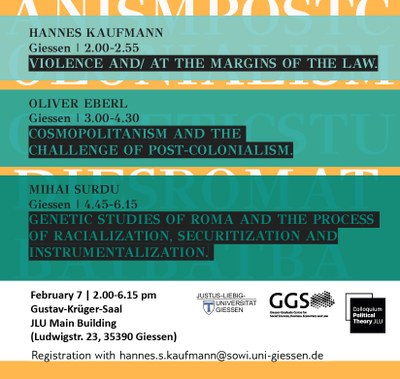 |
Current Events
|
Lectures and Discussion February 7, 2024 | 2-6 pm | Gustav-Krüger-Saal, JLU Main Building (Ludwigstr. 23)/ online "Violence and/at the Margins of Law"
Hannes Kaufmann (Giessen)
“Cosmopolitanism and the Challenge of Post-Colonialism”
Oliver Eberl (Giessen)
“Genetic studies of Roma and the processes of racialization, securitization and instrumentalization”
Mihai Surdu (Giessen)
Please register with Hannes Kaufmann (hannes.s.kaufmann@sowi.uni-giessen.de). |
 |
|
+++ONLINE ONLY+++ Due to the strike in the public transport system, the lecture will be digital only and start at 6pm. Lecture and Discussion (in German) January 24, 2024 | 6-8 pm |ONLINE "Adorno und Gehlen: die intellektuelle Gründung der Bundesrepublik”
Thomas Wagner (Berlin)
Please register with Hannes Kaufmann (hannes.s.kaufmann@sowi.uni-giessen.de). |
 |
|
+++POSTPONED+++ Due to the strike in the public transport system, the lectures will take place on January 17 Lectures and Discussion January 17, 2024 | 5-7 pm | Zeughaus, S3 (Senckenbergstraße 3) “Knowledge and the Experience of the Environment: Science meets the local”
Sergio Orozco (Medellín)
“Theoretical and political actuality of Adorno's ‘The Authoritarian Personality’. Latin American Perspectives”
Austin Prestifilippo (Buenos Aires)
Preparatory readings wil be sent after registration with Hannes Kaufmann (hannes.s.kaufmann@sowi.uni-giessen.de). |
 |
|
Lecture and Discussion December 18, 2023 | 4-6 pm | Philosophikum II, House E, Room 119 "Gedächtnisarbeit in Kolumbien ‚von unten‘: Zum Potential gemeinschaftlicher ästhetischer Prozesse" [in German]
Prof. Dr. Ana María Rabe (Medellín)
The lecture is part of a proseminar, but is open to all interested parties. Participation (online or on site) after registration with Hannes Kaufmann (Hannes.s.kaufmann@sowi.uni-giessen.de) |
|
|
Lecture and Discussion December 18, 2023 | 4-6 pm | Senatssaal, JLU Main Building
The Peace Process in Colombia. Towards a New Model of Transitional Justice? Prof. Dr. Stefan Peters (Bogota/ Giessen) in Discussion with a.o. Ana María Rabe (Medellín)
All interested are welcome! Please register via Max Waibel (Max.Waibel@sowi.uni-giessen.de) |
|
|
Workshop September 25, 2023 | 2-5 pm | tba Frankfurt
"What is Left of Universalism?" Prof. Amos Nascimento (University of Washington, Seattle) Prof. Andreas Niederberger (University Duisburg-Essen)
Comments: Prof. Felmon Davis (Union College Schenectady, NY) Prof. Regina Kreide (JLU Giessen) Hannes Kaufmann (JLU Giessen)
-- Preparatory readings and further details upon registration with Hannes Kaufmann (hannes.s.kaufmann@sowi.uni-giessen.de). |
|
|
Lecture and Discussion July 26, 2023 | 6-8 pm | online Antje Buchholz und Jürgen Patzak-Poor (BARarchitekten, Berlin)
"Housing beyond the market"
--
Registration with Hannes Kaufmann (hannes.s.kaufmann@sowi.uni-giessen.de)
|
|
|
Lectures and Discussion July 12, 2023 | 5-7 pm | Zeughaus S3 (Senckenbergs. 3)/ online Anna-Sophie Schönfelder (JLU): "Capitalism - catalyst of equality or basis for inequality?" Botao Wang (JLU): "Human dignity in an interpersonal relationship: critique of reciprocity in the Confucian natural law"
|
|
|
Masterclass June 14, 2023 | Senatssaal, Justus-Liebig-Universität Gießen Main Building (Ludwigstrasse 23) Gargi Bhattacharyya "Utilising the Concept of Racial Capitalism for Understanding the Central Violences of our Time." in cooperation with the Sonderforschungsbereich 138 "Dynamics of Security". -- For further information see the Website.
|
|
|
International Conference June 12-13, 2023 | Aula, Justus-Liebig-Universität Giessen Main Building (Ludwigstrasse 23) "Democracy in Uncertain Times" in cooperation with the Sonderforschungsbereich 138 "Dynamics of Security". -- Further information, full program and registration at the Conference-Website. |
|
|
Lecture and Discussion (online only) May 10, 2023 | 5-7 pm | online Eva von Redecker (Verona) "Mimesis, projection, and possessive Authoritarianism after Adorno"
--
Participation (online) is open for everyone interested! For registration and preparatory readings please write to hannes.s.kaufmann@sowi.uni-giessen.de
|
|
|
Lecture and Discussion April 26, 2023 | 5-7 pm | Zeughaus S3/online Ayelet Banai (Haifa) "The right to exclude and the duty to include: self-determination, equal opportunity and immigration"
--
Participation (on-site or online) is open for everyone interested! For registration and preparatory readings please write to hannes.s.kaufmann@sowi.uni-giessen.de
|
|
|
Semester Overview Summer Term 2023
|
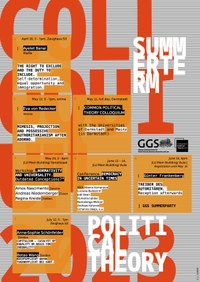 |

